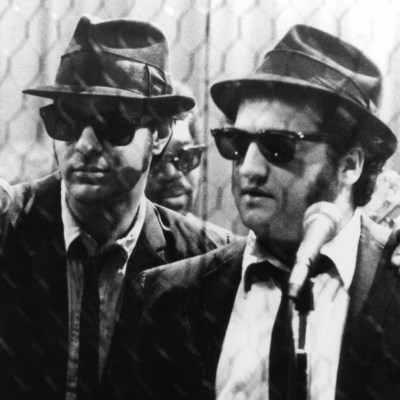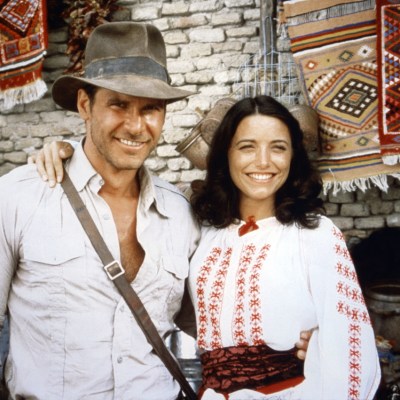2025 has barely begun but it already feels like a lot. Climate change-fueled wildfires continue to ravage Los Angeles and parts of Southern California while unease grips the news. A moment of transition on at least one side of the pond for our U.S. readers breeds apprehension, and the rest of the year can look foreboding if you pay attention to the headlines.
It’s times like these where it’s nice to have a comforting movie, a piece of escapism, that can lift a mood and maybe rally your outlook for the days and months ahead. Here are some suggestions we think might appeal to anyone feeling glum right now…
Raiders of the Lost Ark (1981)
The 1930s were definitely not “simpler times.” The Great Depression reached it deepest crater in the U.S. and fascism was on the march in Europe, culminating in the start of the Second World War. But the entertainments, from Fred Astaire and Ginger Rogers musicals to old Saturday morning serials, could be thrillingly simplistic and reassuring. George Lucas resurrected that certainty with gusto by way of the Indiana Jones character, and Steven Spielberg made it timeless when he directed Indy’s first and best three movies in the 1980s, beginning with Raiders of the Lost Ark.
A deliberate throwback to ‘30s serials and the boys adventure literature that inspired them, Raiders is the action masterpiece that set the standard for the modern blockbuster’s pacing as Harrison Ford’s archaeologist circumnavigates the world in search of the Ark of the Covenant. Oh, and along the way he punches, shoots, and otherwise brutalities a bunch of book-burning, cult-worshipping Nazis while doing so. Which is nice.
The Sound of Music (1965)
For the magic of pure escapism, there is no genre more transportive or joyful than a musical done right. The soaring crescendo of a beautiful song, performed exquisitely by gorgeous talent, is the stuff of Broadway and Hollywood dreams. And you get all three inside of the first few minutes of Robert Wise’s The Sound of Music , the rare adaptation of a Broadway show that improves on the stage version. All of the classic Rodgers and Hammerstein songs are here, but in the movie Julie Andrews is belting “the hills are alive” right there atop the Austrian Alps!
The unforgettable moment sets the stage for an epic 70mm spectacle that soars as Andrews’ wayward nun, Sister Maria, takes on the task of tutoring, caring for, and ultimately becoming a mother to seven precocious von Trapp children. The romance between her and the stern Captain von Trapp (Christopher Plummer) is simultaneously schmaltzy and swoon-worthy, and her aural lessons sweeping. Oh, and this loose adaptation of the real-life von Trapp family’s flight from the Nazis after the goose-steppers took over Austria includes a third act where the von Trapps outwit a bunch of fascists and leave one over eager young brownshirt humiliated. These are a few of my favorite things.
The Blues Brothers (1980)
On days like this, it’s nice to know folks like Jake and Elwood Blues are out there. Brothers who on the right occasion can be tapped to go on a mission from God. It is their destiny to spread the gospel of good music, better vibes, and feel-good cinema around the globe. Ray Charles, James Brown, Cab Calloway, and a showstopping Aretha Franklin (to name but a few) are likewise on hand to drop some jazz and R&B standards in between comedy hijinks undertaken by John Belushi and Dan Aykroyd at the height of their cool.
John Landis helms the first (and still best) film adaptation of an SNL sketch, which expands the concept of former castmates geeking out in sunglasses into an easygoing hangout movie where Aykroyd and Belushi slouch through the greater Chicago area. Along the way, they get a band together, piss off rednecks, and merrily lead local law enforcement through one of the greatest car chase sequences of all time. Wacker Drive might as well be renamed after them. Also, lest we forget, they happen to destroy a Neo-Nazi demonstration with the Bluesmobile, leading a couple of American fascists to chase them for the rest of the picture until the Blues boys trick the brownshirts into plummeting to their deaths. Good times all around.
Casablanca (1942)
Pound for pound still the greatest movie made in Hollywood’s Golden Age, Michael Curtiz’s Casablanca is a dizzying collection of all-time movie quotes courtesy of a screenplay by Julius and Philip G. Epstein, and Howard Koch. “Here’s looking at you, kid;” “everybody comes to Rick’s;” “we’ll always have Paris;” “of all the gin joints in al the towns in all the world, she walks into mine;” “round up the usual suspects;” “Louie, I think this is the beginning of a beautiful friendship;” “play it [again], Sam.” And more!
But beyond a witty and wistfully romantic screenplay, Casablanca is still a sweeping WWII melodrama about the problems of three little people, one of whom (Ingrid Bergman) thought her husband was dead in a concentration camp when she met Rick (Humphrey Bogart), only to find the hubby (Paul Henreid) returned to her when they’re all trying to escape the jackboots in Vichy-controlled Morocco. Also released during the war, and at a time when the Nazis still occupied Paris and North Africa, there is a pang of raw, tangible emotion as the cast of largely expat Europeans, including French actress Madeleine Lebeau, sing the French national anthem, “La Marseillaise,” while drowning out the fascists at a nightclub. It’s still put a lump in your throat to hear Lebeau shout, “Vive la France! Vive la liberté!”
The Producers (1967)
Mel Brooks‘ iconic movie musical about what might happen if you tried to make more money with a flop than you would with a hit—and what could in turn happen if that flop became a smash—The Producers has faded into legend. It’s a movie about every two-bit hustler and conman’s worst fear: what if the bill came due? Zero Mostel and Gene Wilder make an iconic duo as the unscrupulous Broadway producers who try to schmooze, cast, and cajole their way into financial failure and instead end up in Sing Sing for their misdeeds. (Those were the days.)
The movie is best remembered though for making good on Mel Brooks’ lifelong pledge to “make the world laugh at Adolf Hitler.” The giggles we still get from “Springtime for Hitler” are proof he succeeded then and reassuringly now. Still, today you might get as much enjoyment out of Kenneth Mars’ aged Nazi raging at everyone laughing at his strongman idol.
The Rocketeer (1991)
Not a financial hit when it came out, Joe Johnston’s The Rocketeer has stood the test of time as a bonafide cult classic due to its sincere optimism and sweet affability. We imagine one of James Horner’s most sentimental and Americana of scores—and this is the guy who won his Oscar for tearjerker compositions in Titanic!—went a long to way cultivate that feeling. But the whole movie taps into earnest wholesomeness, perhaps even more so than its obvious Indiana Jones influences.
This one adapts Dave Stevens’ 1980s comic book series of the same and conjures also the appeal of 1930s and ‘40s era comics and radio shows with its deliberately retro pulp hero in the art deco helmet and Golden Age Hollywood backdrop. There he battles Timothy Dalton’s pitch perfect Errol Flynn stand-in, who (surprise!) is actually a secret Nazi saboteur determined to steal Howard Hughes’ rocket. Luckily, all-American pilot Cliff Secord (Billy Campbell) and his best girl, movie starlet Jenny Blake (a va-va-voom Jennifer Connelly), stand in his way. They even get local wiseguy mobster Eddie Valentine (Paul Sorvino) in on the act. “I may not make an honest buck,” Sorvino seethes, “but I’m a hundred percent American. I don’t work for no two-bit Nazi.” It’s a good sentiment.
X-Men: First Class (2011)
Another superhero movie that’s a little more modern in setting and making, Matthew Vaughn’s X-Men: First Class feels strangely underrated these days. This might be because even in 2011, the superhero genre was pivoting to more outlandish interconnected fantasies. Yet one of the best things about First Class is that for all of its frothiness, it keeps one foot in something approximating the real-world, at least by way of 1960s Sean Connery James Bond movies.
Set during the Cuban Missile Crisis in 1962, First Class did the “throwback to Marvel Comics’ glory days” thing about 14 years before the upcoming Fantastic Four movie, and it did so with a real eye for detail when it came to imitating the pop culture of the era, if not the reality. It also is the best exploration of Charles Xavier and Magneto’s frenemy-ship in any medium (here played young and maybe flirtatiously by James McAvoy and Michael Fassbender).
It also features an absolutely badass moment where Fassbender turns Magneto into a full-fledged antihero. Doing his best Connery impression, the Holocaust survivor walks into an Argentine bar and happily speaks German with some of the locals before being asked what his parents’ names were by some older clientele. “They didn’t have a name,” Fassender smiles. “It was taken from them by ‘pig farmers’ and ‘tailors.’” He then shows the serial numbers tattooed onto his arm to men who claim to be hiding out in South America simply for farming and making clothes. What happens next is immensely satisfying…
Inglourious Basterds (2008)
“You probably heard we ain’t in the prisoner-takin’ business; we’re in the killin’ Nazis business,” Brad Pitt purrs with a dubious yet wonderful Appalachian accent. “And cousin, business is a-boomin’!” Such is the pure dopamine-thrill of the so-called “Basterds,” the titular men on a mission in Quentin Tarantino’s sixth motion picture. But despite that pride of title placement, you shouldn’t be deceived. They’re merely an ornate decoration on top; frosting on the cake.
Inglourious Basterds is really a wide ensemble of lives and stories intersecting in Nazi-Occupied France circa 1944. The film follows soldiers, undercover film critics, an ingeniously played S.S. officer from hell (Cristoph Waltz), and finally a Jewish woman (Mélanie Laurent) who escaped the murder of her family and now lives in plain sight as a gentile movie theater owner in Paris. It is a fantasy about the restorative power of cinema and the fleeting beauty of escapism. Still, it’s also about killin’ Nazis. Lots of ‘em. And sometimes with a baseball bat.
The post Movies That Will Make You Feel Better About the World Today appeared first on Den of Geek.




0 Commentaires